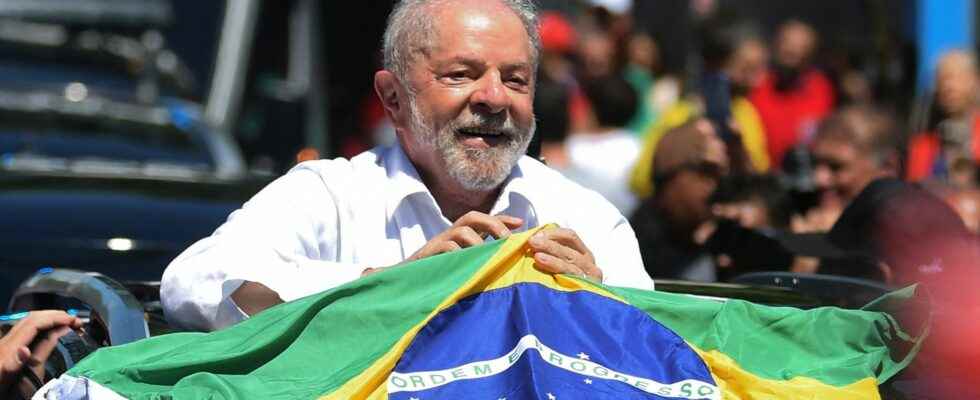The left-wing candidate Luiz Inacio Lula da Silva expressed his “confidence in a victory for democracy” by voting on Sunday morning shortly after his rival, the far-right outgoing president Jair Bolsonaro, for the second round of the presidential election in Brazil whose results promise to be tight. Long-sleeved white shirt Lula, 77, who voted in Sao Bernardo do Campo, the southeastern city where he started out as a union leader, said he hoped the outcome of the ballot, which he is the favorite, will “restore peace between Brazilians”, at the end of an ultra-polarized campaign.
Jair Bolsonaro, 67, also saying he is sure of his victory, was among the first of the 156 million voters to vote at the opening at 8:00 a.m. (11:00 GMT), in the Vila militar district of Rio de Janeiro. “God willing we will win tonight. Or better yet, Brazil will be victorious tonight,” said the president, very smiling, wearing a t-shirt with the inscription “Brazil” yellow and green, to the colors of the flag of Brazil loved by Bolsonarists.
The campaign between the two men who oppose everything took place in a brutal and ultra-polarized climate which saw them insult each other copiously while social networks carried torrents of misinformation. “I think it’s the best government Brazil has ever had,” said an Afro-Brazilian lawyer, Eliane de Oliveira, 61, who voted for Bolsonaro in Copacabana, Rio de Janeiro.
A close vote
Near the famous beach, Gustavo Souza, a physical education teacher, voted for Lula, whom he hopes will “improve the lives of many people”. He says he is nervous and “a little scared” awaiting the result. “People have become so radical,” he breathes. In Sao Paulo, Marcelo Silveira Curi, a 35-year-old psychologist, also voted for Lula, even though he “is not the ideal candidate”, because of all the “economic and social setbacks” under Bolsonaro.
For Nadia Faraj, a 61-year-old unemployed graduate who votes in the capital Brasilia, “this is a decisive moment for the country” which “needs Bolsonaro”. If the polls have been predicting for months a third four-year term for Luiz Inacio Lula da Silva after those from 2003 to 2010, Jair Bolsonaro can still believe it.
According to the latest Datafolha survey on Saturday evening, the gap narrowed, with Lula winning 52%/48%. The margin of error is 2 points and the polls had heavily underestimated Bolsonaro’s score in the 1st round (43% against 48% for Lula). The major issue between the two rounds was the hunt for the 32 million abstainers from the 1st round (21%). Lula won only six million votes in advance on October 2. “It’s a lot tighter than anyone would have thought,” Brian Winter, editor of Americas Quarterly, told AFP, “it’s going to be a confusing election.”
Will Bolsonaro accept the result if he is the first president running for a second term not to be re-elected since the return to democracy in 1985? After launching incessant attacks against the “fraudulent” system of electronic ballot boxes, he said on Friday: “Whoever has the most votes wins. It’s democracy”, without convincing.
A decisive campaign
“Bolsonaro will question the result,” said Rogerio Dultra dos Santos of the Federal University of Fluminense. Many fear a Brazilian replica of the assault on Capitol Hill after the defeat of Donald Trump which could target, for example, the Supreme Court so often vilified by Bolsonaro. The ex-captain can count on “the support of his most radicalized voters (…) and cause trouble”, according to the analyst, who however does not see the armed forces venturing into a coup and emphasizes that democratic institutions are strong.
Lula, a former steelworker with an extraordinary destiny, who experienced the disgrace of prison (2018-2019) then the cancellation of his convictions for corruption, said he hoped that Bolsonaro “will recognize the result” if he loses. Social networks – the sole source of information for the majority of the 170 million Brazilian users – have conveyed an unprecedented mass of false information.
With this dirty campaign, the real concerns of the population have been neglected: inflation, unemployment, poverty or hunger, from which 33 million Brazilians suffer. The offices will close at 5:00 p.m. (20:00 GMT), 12 governors of Brazilian states will also be elected, and the name of the president of the immense country with 215 million inhabitants will be known before 8:00 p.m. (23:00 GMT).
